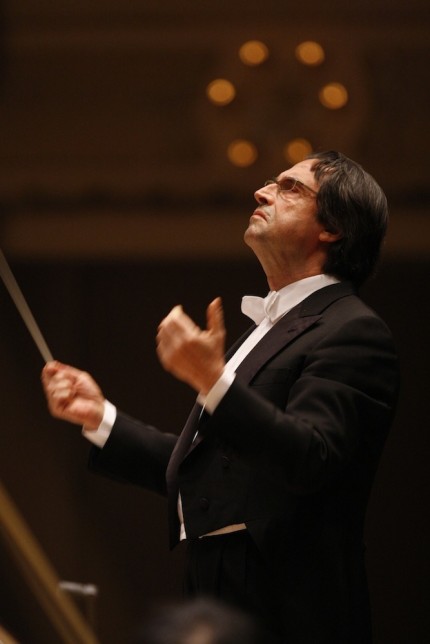Muti, CSO soar in Russian music of art and war

For the second week of his Chicago Symphony Orchestra winter residency, Riccardo Muti offered two Russian rarities for orchestra and chorus. Thursday night’s lineup will be one of the three programs that Muti and the CSO will take to Carnegie Hall next weekend.
In addition to Tchaikovsky, Muti is also spotlighting the symphonies of Alexander Scriabin this season. Thursday night at Orchestra Hall the lesser-known work was Scriabin’s Symphony No. 1, heard in its first CSO performance.
With his early Chopin-esque and chromatic piano sonatas, it was inevitable that the hyperactive Russian sensualist would soon gravitate toward the enticing opportunities of writing for a full symphony orchestra.
There are undoubted beauties in Scriabin’s epic 1899 score, which is cast in six movements and runs over 50 minutes. The first movement Lento, which serves as a prelude of sorts, is lushly lyrical and scored with silver-screen richness. For his first large-scale symphonic work, the music is crafted with remarkable individuality and audacity, breathing a surging perfumed exoticism, like Szymanowski on steroids.
Yet despite the iridescent coloring and surface attractions, Scriabin’s symphony ultimately adds up to less than the sum of its parts. The vocal finale, in particular, is the least convincing movement, with a mezzo and tenor soloist singing Scriabin’s heavy-breathing text in praise of art, which is then taken up by a large chorus for a resounding coda.
Almost exactly thirty years ago, Riccardo Muti recorded Scriabin’s Symphony No. 1 with the Philadelphia Orchestra, a project that would eventually encompass all five Scriabin symphonies, and those performances remain the finest integral Scriabin set available today.
The CSO’s music director has a clear attachment and sympathy for this repertory, and the refined, luminous yet richly upholstered performance Thursday night made the strongest possible case for Scriabin’s symphony in its CSO debut.
Muti brought his brand of taut concentration and finely calibrated dynamics to the score, giving the big moments full power and sonority while avoiding soupiness. The Lento opening was drop-dead gorgeous, blossoming forth with remarkable delicacy. Throughout Muti brought out the surging, rhapsodic style with roiling power while conveying the moments of airy playfulness as in the charmingly perky fourth movement.
The unwieldy finale was aided by having two Russian vocal soloists, and Alisa Kolosova and Sergey Skorokhodov provided sturdy, idiomatic vocalism. The resplendent singing by the CSO Chorus in the sonorous final pages soared thrillingly for a spectacular coda.
Yet it was the playing of the CSO that stays in the memory, the musicians delivering the exotic multihued lyricism of the score individually and as an ensemble across all sections. Scriabin gives the clarinet some of the best moments and Stephen Williamson’s playing was magnificent, ranging from the most delicate tendrils of tone to a full, woodsy sound that suited this sensual music. Atlanta Symphony principal flute Christina Smith performed on the same high level.
Prokofiev’s music for Sergei Eisenstein’s Alexander Nevsky may not be the first truly great film score–I’d give that nod to Max Steiner’s relentlessly inventive music for King Kong in 1933—but it’s one of the most distinctive, kept alive in concert form in the cantata of the same name for which the composer adapted his film music.
Here too there are moments of banality—as with the cartoon music in the middle of the “Battle of the Ice”—but also passages of emotional depth and grandeur that make up the balance.
If Muti underlined the impressionistic, French qualities of Scriabin’s mystic spirituality, here he favored a harsher, more aggressive sound that suited the bombast of Prokofiev’s sonic Socialist Realism.
The performance here was less consistent. Principal trumpet Christopher Martin had a very off night and mezzo Kolosova brought little emotional engagement to the girl’s search for her deceased lover in “The Field of the Dead.”
Otherwise, under Muti’s tight yet flexible direction, the orchestra played with characteristic fervor and refinement, especially the large percussion battery. But this was really the CSO Chorus’s work to shine in, which they did splendidly. Duain Wolfe’s singers delivered the Russian text with a dark, vocal quality that sounded convincingly authentic, with the big choral moments almost overwhelming in impact.
The program will be repeated 8 p.m. Friday and Saturday. cso.org; 312-294-3000.
Posted in Performances




